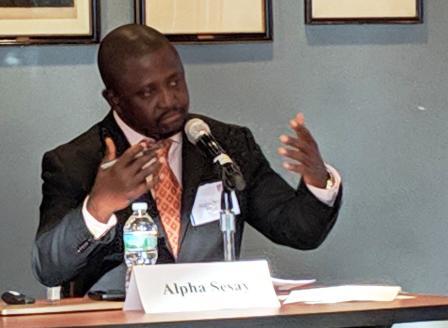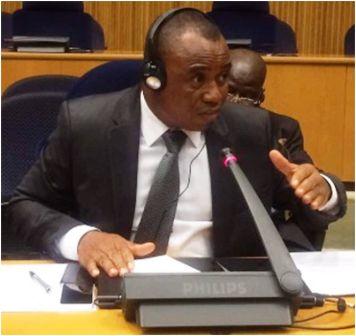IBA welcomes conclusion of ICC’s first trial
The International Bar Association (IBA) yesterday welcomed verdict in case of the first suspect to be tried before the International Criminal Court (ICC), Thomas Lubanga Dyilo (in photo). Calling the judgment a symbolic achievement for the ICC, the IBA says that though hampered by several procedural challenges, the Lubanga case attests to the integrity of ICC proceedings and has made a significant contribution to international justice.
ICC’s Trial Chamber I concluded that Mr. Lubanga was guilty of conscripting, enlisting and using child soldiers younger than 15 years of age in hostilities in the Democratic Republic of Congo (DRC) during 2002 and 2003. The verdict marks the end of a lengthy process which began in 2005 with Mr. Lubanga’s arrest in the DRC, subsequent surrender in 2006 to the ICC and a protracted trial which was twice halted for prosecutorial breaches. In total, Thomas Lubanga has spent six years in ICC custody despite provisions in the Rome Statute, the Court’s founding legal instrument, stipulating his right to be tried without delay.
As the ICC’s first trial, the Lubanga case has major significance. The trial is noteworthy for:
- Bringing timely global attention to the misuse of children in combat;
- Allowing victims to participate for the first time in international proceedings;
- A significant number of witnesses protected by the Court’s protection scheme;
- Radical steps taken by judges – including staying proceedings when necessary – to ensure that the trial was fair; and
- Judicial rulings of key provisions of the Rome Statute on procedural and substantive law providing important guiding principles for other cases before the Court.
Reminiscent of the Tadic case, the first before the International Criminal Tribunal for the former Yugoslavia, the Lubanga case dealt with complex and novel legal issues, some of which threatened to derail proceedings.
Richard Goldstone, Honorary President of the International Bar Association’s Human Rights Institute and former Chief Prosecutor of the International Criminal Tribunals for the former Yugoslavia and Rwanda commented: ‘The Lubanga case is a major achievement for the International Criminal Court. Like all first trials, it was no stranger to procedural challenges and uncertainties as the prosecutor and judges grappled with novel issues, such as victims’ participation. Many of them had no precedent at the ad hoc tribunals. It is a tribute to their efforts, and the fortitude of the defence, that despite major setbacks, every effort was made to ensure that the trial was fair and justice done. Undoubtedly, future international trials will benefit from the jurisprudential foundations and the lessons learnt from the Lubanga case’.
Despite its achievements, the Lubanga case persisted amid a plethora of problems. Disappointed by the limited charges, victims’ representatives in the case, unsuccessfully petitioned judges to recharacterise the charges to reflect the sexual violence experienced by girl soldiers in particular. The defence complained that the case was manifestly unfair as the prosecution struggled with their obligation to disclose evidentiary material without jeopardizing the security of its witnesses and confidential information. Arguing that prosecutorial misconduct had resulted in an abuse of process, the defence ultimately requested that judges halt the trial permanently on the basis of non-disclosure and prosecutorial over-reliance on intermediaries who allegedly coerced witnesses to falsify testimony.
In their verdict, the judges took note of the challenging procedural history of the case but emphasised that they were satisfied of Mr Lubanga’s guilt based on the evidence.
Dr Mark Ellis, IBA Executive Director says ‘It is highly symbolic that the verdict in the International Criminal Court’s first case has been delivered during a year when the international community reflects on the Court’s 10 years of operation. The Lubanga case reflects the complexity of international criminal trials that must meet the high expectations of victims and the international community, while also ensuring fairness to the accused. Despite procedural challenges during the trial, the Lubanga verdict underscores the significant contribution the ICC has made to international justice.’
Distributed by the African Press Organization on behalf of the International Bar Association (IBA).
Stay with Sierra Express Media, for your trusted place in news!
© 2012, https:. All rights reserved.





